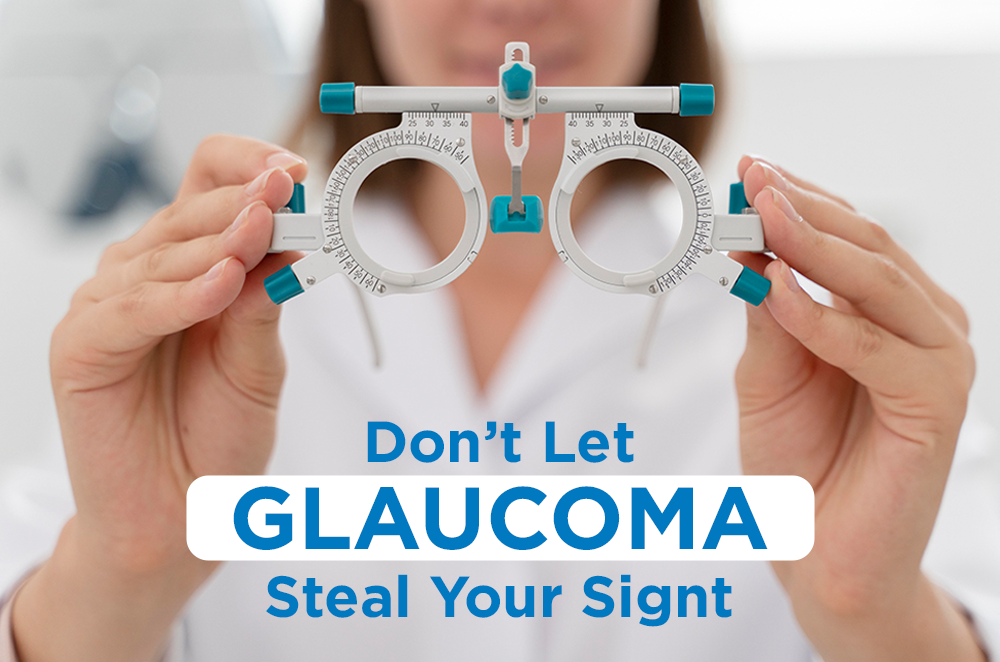January is National Glaucoma Awareness Month, a time dedicated to raising awareness about this sight-stealing disease. Glaucoma is often called the “silent thief of sight” because it typically has no noticeable symptoms in its early stages. By the time vision loss occurs, the damage is often irreversible. But don’t let glaucoma steal your sight! This blog post will arm you with the knowledge you need to detect, treat, and ultimately protect yourself from glaucoma. With early detection and treatment, you can significantly slow or prevent vision loss.
What is Glaucoma?
Glaucoma is a group of eye diseases that damage the optic nerve, which is responsible for transmitting visual information from the eye to the brain. Increased pressure within the eye (intraocular pressure) often causes this damage.
Risk Factors
While anyone can develop glaucoma, certain factors increase your risk:
Age: Risk increases over age 40.
Family history: Having a family member with glaucoma increases your risk.
Ethnicity: People of African, Hispanic, and Asian descent are at higher risk.
Medical conditions: Diabetes, high blood pressure, and migraines can increase risk.
Eye injuries or certain eye conditions: Previous eye trauma or conditions like severe nearsightedness can increase risk.
Glaucoma Symptoms
In its early stages, glaucoma often has no noticeable symptoms. This is why regular eye exams are crucial. As the disease progresses, you may experience:
- Loss of peripheral (side) vision
- Tunnel vision in advanced stages
- Halos around lights
- Eye pain
- Nausea and vomiting (in acute angle-closure glaucoma)
Detection and Treatment
Diagnosing glaucoma requires a comprehensive eye exam that goes beyond a simple vision check. Your eye doctor uses a variety of tools and techniques to assess your eye health and detect any signs of glaucoma.
For instance, tonometry is a crucial test that measures the pressure inside your eye (intraocular pressure) Elevated eye pressure is a key risk factor for glaucoma. Additionally, ophthalmoscopy allows your doctor to examine the optic nerve at the back of your eye for any signs of damage. Finally, a visual field test assesses your peripheral vision, which is often affected in the early stages of glaucoma.
If your eye doctor detects glaucoma, treatment typically focuses on lowering eye pressure to prevent further damage to the optic nerve. Generally, eye drops are often the first line of defense, working to reduce fluid production or improve fluid drainage from the eye. In some cases, a healthcare professional may use laser treatment to improve fluid flow. For more advanced cases, surgery may be necessary to create a new drainage channel for the fluid.
Don’t Let Glaucoma Steal Your Sight
Taking proactive steps to protect your vision is the best defense against glaucoma. First and foremost, schedule regular comprehensive eye exams. Early detection is crucial in preserving your sight, as glaucoma often has no noticeable symptoms in its early stages. Be sure to inform your eye doctor about your family history, especially if you have relatives who have been diagnosed with glaucoma. This knowledge helps your doctor assess your risk and recommend appropriate screening schedules.
Furthermore, maintaining a healthy lifestyle also plays a role in protecting your vision. Eating a balanced diet, exercising regularly, and managing conditions like high blood pressure and diabetes can all contribute to overall eye health. This Glaucoma Awareness Month, take control of your vision health. Schedule an eye exam for yourself and encourage your loved ones to do the same. Don’t let glaucoma steal your sight!
Resources:
https://www.cdc.gov/vision-health/about-eye-disorders/glaucoma.html
Disclaimer:
The Comanche County Memorial Hospital website does not provide specific medical advice for individual cases. Comanche County Memorial Hospital does not endorse any services obtained through information provided on this site, articles on the site or any links on this site.
Use of the information obtained by the Comanche County Memorial Hospital website does not replace medical advice given by a qualified medical provider to meet the medical needs of our readers or others.
While content is frequently updated, medical information changes quickly. Information may be out of date, and/or contain inaccuracies or typographical errors. For questions or concerns, please contact us at contact@ccmhhealth.com.

